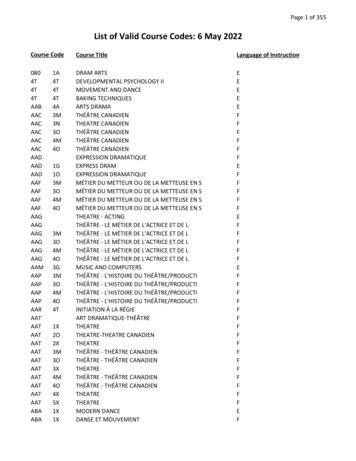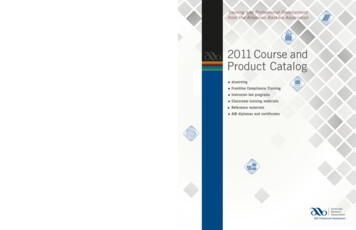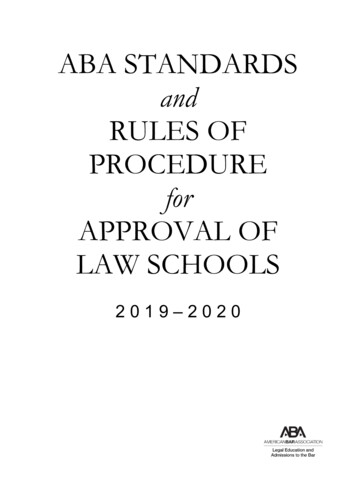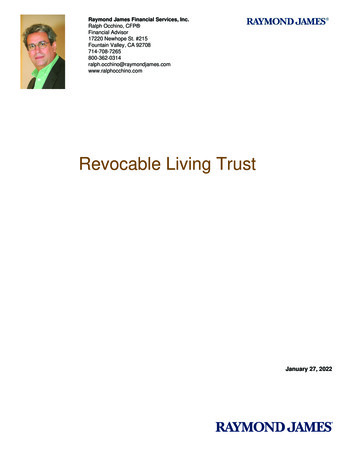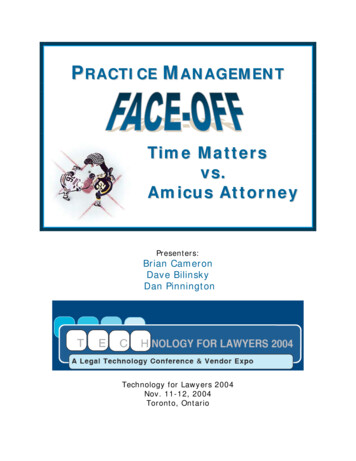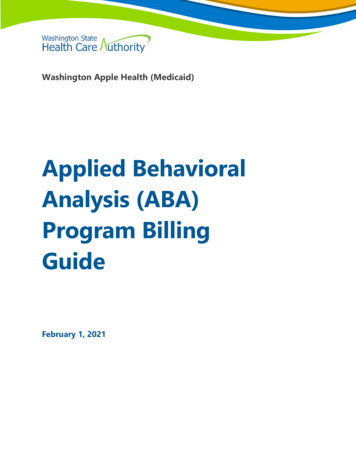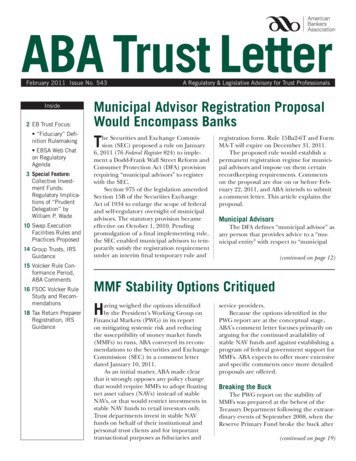
Transcription
ABA Trust LetterFebruary 2011 Issue No. 543Inside2 EB Trust Focus: “Fiduciary” Definition Rulemaking EBSA Web Chaton RegulatoryAgenda3 Special Feature:Collective Investment Funds:Regulatory Implications of “PrudentDelegation” byWilliam P. Wade10 Swap ExecutionFacilities Rules andPractices Proposed14 Group Trusts, IRSGuidance15 Volcker Rule Conformance Period,ABA Comments16 FSOC Volcker RuleStudy and Recommendations18 Tax Return PreparerRegistration, IRSGuidanceA Regulatory & Legislative Advisory for Trust ProfessionalsMunicipal Advisor Registration ProposalWould Encompass BanksThe Securities and Exchange Commission (SEC) proposed a rule on January6, 2011 (76 Federal Register 824) to implement a Dodd-Frank Wall Street Reform andConsumer Protection Act (DFA) provisionrequiring “municipal advisors” to registerwith the SEC.Section 975 of the legislation amendedSection 15B of the Securities ExchangeAct of 1934 to enlarge the scope of federaland self-regulatory oversight of municipaladvisors. The statutory provision becameeffective on October 1, 2010. Pendingpromulgation of a final implementing rule,the SEC enabled municipal advisors to temporarily satisfy the registration requirementunder an interim final temporary rule andregistration form. Rule 15Ba2-6T and FormMA-T will expire on December 31, 2011.The proposed rule would establish apermanent registration regime for municipal advisors and impose on them certainrecordkeeping requirements. Commentson the proposal are due on or before February 22, 2011, and ABA intends to submita comment letter. This article explains theproposal.Municipal AdvisorsThe DFA defines “municipal advisor” asany person that provides advice to a “municipal entity” with respect to “municipal(continued on page 12)MMF Stability Options CritiquedHaving weighed the options identifiedby the President’s Working Group onFinancial Markets (PWG) in its reporton mitigating systemic risk and reducingthe susceptibility of money market funds(MMFs) to runs, ABA conveyed its recommendations to the Securities and ExchangeCommission (SEC) in a comment letterdated January 10, 2011.As an initial matter, ABA made clearthat it strongly opposes any policy changethat would require MMFs to adopt floatingnet asset values (NAVs) instead of stableNAVs, or that would restrict investments instable NAV funds to retail investors only.Trust departments invest in stable NAVfunds on behalf of their institutional andpersonal trust clients and for importanttransactional purposes as fiduciaries andservice providers.Because the options identified in thePWG report are at the conceptual stage,ABA’s comment letter focuses primarily onarguing for the continued availability ofstable NAV funds and against establishing aprogram of federal government support forMMFs. ABA expects to offer more extensiveand specific comments once more detailedproposals are offered.Breaking the BuckThe PWG report on the stability ofMMFs was prepared at the behest of theTreasury Department following the extraordinary events of September 2008, when theReserve Primary Fund broke the buck after(continued on page 19)
American Bankers AssociationEB TRUST FOCUS“Fiduciary”Definition Rulemaking AdjustedThe Employee Benefits SecurityAdministration (EBSA) published anotice of hearing and extension ofthe comment period on its proposeddefinition of “fiduciary” in connection with providing investment adviceto employee benefit plans. Commentswere due by February 3, 2011, and apublic hearing will be held on March1 and, if necessary, March 2.EBSA is contemplating a broaderdefinition of “fiduciary” that wouldencompass those who advise a plan,the plan’s fiduciaries, or the plan’sparticipants. For example, an advisory firm hired by a bank trustee toprovide expert advice on plan investments would assume fiduciary dutiesunder the proposed definition.Investment advisers who fall under the definition would have to observe fiduciary standards of conductunder the Employee RetirementIncome Security Act (ERISA) andwould be prohibited from engagingin conflicts of interest, self-dealing,and other prohibited acts.By providing extra time for comments and holding a public hearing, EBSA appears to recognize thesignificance of the proposed rulefor plans, participants, beneficiaries,and service providers. The noticewas published on January 12, 2011(76 Federal Register 2142) and can befound at fPrevious article in ABA Trust Letter“Bank Trust Departments GaugeImpact of Broader Definition of“Fiduciary,” January 2011, page 1.2 February 2011EBSA Web ChatReveals RegulatoryPlansAs another means of communicating with the employee benefitplan community, Assistant SecretaryPhyllis Borzi and her staff held alive, hour-long web chat on January4, 2011, to discuss EBSA’s upcoming regulatory agenda. The webchat was interactive and participantscould submit comments and questions and have them answered.Following are a few highlights: “Fiduciary” Definition. The EBSAproposal to clarify the circumstancesunder which a person will be considered a “fiduciary” when providing investment advice to employeebenefit plans and their participantsand beneficiaries “is intended to assure retirement security for workersin all jobs, regardless of income level,by ensuring that financial advisersand similar persons are requiredto meet ERISA’s strict standards offiduciary responsibility,” Borzi said.The proposal would change a rulethat “we believe may inappropriatelylimit the types of investment advicerelationships that give rise to fiduciaryduties,” she added. Service Provider CompensationDisclosure. EBSA hopes to finalizethe interim final rule on Section408(b)(2) by April 2011. It was notclear whether a delayed effectivedate would be provided. The rule,which will become effective on July16, 2011, requires pension plan service providers to disclose the directand indirect compensation theyreceive for plan services. 401(k) Plan Disclosures. EBSAexpects to issue a request for information regarding electronic deliveryof required 401(k) plan disclosuresunder ERISA sometime during thenext six to eight weeks. The EBSAwill evaluate whether the currentregulatory standards for electronicdistribution of required plan disclosures should be updated to harmonize with, among other things, recentguidance from the Securities andExchange Commission on the useof electronic channels for deliveringproxy materials to shareholders. Investment Advice Arrangements. A final regulation on investment advice arrangements for participant-directed individual accountplans is expected to be issued by May2011. The rule was re-proposed onMarch 2, 2010, and would implement a new prohibited transactionexemption created by the PensionProtection Act of 2006. Under therule, an “eligible investment advicearrangement” is one that uses feeleveling or computer modeling todetermine what advice to give participants and beneficiaries. Target Date Fund Disclosures.EBSA has no plan at this point todevelop a model format for theproposed disclosures for target datefunds. The comment period on theTDF transparency rule closed onJanuary 14, 2011.Those who were unable to participate can replay the web chat bygoing to: m nPrevious articles in ABA Trust Letter“EBSA Proposes Target DateFunds Transparency Rule,” January2011, page 11.“Plan Service Provider Fee Disclosure Interim Final Rule,” October2010, page 1.“EBSA Re-Proposes Plan Investment Advice Rules,” April 2010,page 9.ABA TRUST LETTER
American Bankers AssociationCollective Investment Funds:Regulatory Implications of “Prudent Delegation”by William P. Wade*Regulation 9 (12 C.F.R. Part 9) ofthe Office of the Comptrollerof the Currency (OCC) requires abank maintaining a collective investment fund (CIF) to have “exclusivemanagement” of the CIF. However,Regulation 9 also permits the bankto delegate responsibilities as a“prudent person” might do.1 A bankconsidering a delegation of CIFinvestment responsibilities shouldconsider two important questions:First, what are the expectationsof the OCC and other bank regulators in regard to a “prudent delegation” of CIF investment responsibilities to an investment adviser?2Second, what are the regulatoryimplications of a “prudent delegation” of CIF investment responsibilities under the Employee Retirement Income Security Act of 1974(ERISA)? The Internal RevenueCode of 1986 (Code)? The federalsecurities laws?The answers require a reviewof the origins and purposes of the“exclusive management” and “prudent delegation” requirements underbanking regulations, and consideration of how those requirementsapply — or should apply — in thecontext of other applicable regulatoryschemes. Not surprisingly, the U.S.Department of Labor (DOL), the Internal Revenue Service (IRS), and theSecurities and Exchange Commission(SEC) have different perspectives onthese requirements. However, certainfundamental principles suggest common ground for reconciling relevantregulatory requirements. Copyright William P. Wade 2010. All rightsreserved.ABA TRUST LETTERExclusive ManagementRegulation FThe “exclusive management”requirement originated with “Regulation F,” promulgated by the Federal Reserve Board (FRB) in 1937 togovern the management and operation of common trust funds. Regulation F provided, in pertinent part,that a bank must have the “exclusivemanagement” of a common trustfund.3 This was consistent with trustprinciples prevailing at the time,which generally prohibited a trusteefrom delegating functions the trusteereasonably could be expected toperform itself.4Accordingly, the FRB took a strictview of the “exclusive management”requirement, generally interpretingit to forbid delegation of commontrust fund investment managementfunctions. In a ruling issued in 1959,for example, the FRB concludedthat the investment of common trustfund assets in shares of an “investment trust” (i.e., mutual fund) wouldinvolve delegation of investmentmanagement “which would be bothinconsistent with the stated purposesand uses of such funds and in violation of the [exclusive managementrequirement].”5Regulation 9The “exclusive management” requirement applicable to common trustfunds under Regulation F technically did not extend to collective trustfunds for employee benefit trusts,which began to appear in the 1950s.However, when regulatory authority over national bank trust activitieswas transferred from the FRB to theOCC in 1963, the OCC retained therequirement in Regulation 9 andextended it to all CIFs.6 The OCCindicated that the exclusive management requirement was:designed generally to ensure thata national bank fiduciary has therequisite authority to administera collective fund in satisfactionof all its fiduciary responsibilities,and to prevent delegations orreservations of authority whichinterfere with the bank’s fulfillment of these responsibilities.7The OCC generally took the position that the “exclusive management”requirement did not preclude a bankfrom retaining an investment adviserto assist it in managing a CIF. If theinvestment adviser was not affiliatedwith the bank, the OCC typicallyrequired, among other things, thatthe bank retain authority to make“final” investment decisions for thefund, which meant that an unaffiliated investment adviser was permittedonly to make investment “recommendations” for the bank’s considerationand final decision.8 If the adviserwas an affiliate of the bank, the bankwas expected to establish specificinvestment guidelines the affiliatedadviser would be obligated to follow,frequently review the adviser’s activities, and retain contractual authorityto terminate the adviser at will.9 TheOCC also indicated that, if the adviserwas affiliated with the bank throughthe bank’s holding company, thebank would need to approve eachinvestment transaction before the affiliate placed the trade.10(continued on page 4)February 2011 3
American Bankers Association(continued from page 3)Prudent DelegationThe RestatementThe law of trusts eventuallyevolved from where it had stood in1937. In 1992, the “Prudent InvestorRule” of the Restatement (Third) ofTrusts (Restatement) accepted modern investment theories as part andparcel of basic trustee investment responsibilities.11 Importantly, the Prudent Investor Rule authorized — andin some cases required — trustees todelegate investment responsibilitiesto others. However, any such delegation must be prudent and appropriate under the circumstances.12The Restatement provides guidance as to when delegation is appropriate and how a delegation shouldbe implemented and monitored.13The general principle, however,is that a trustee who delegates itsresponsibility to an agent should carefully monitor the agent to confirmthat the delegation continues to beappropriate and in the best interestsof the trust. Among other things,the trustee has a duty to monitor theagent’s performance and compliancewith the terms of the delegation and,upon discovering a breach of duty bythe agent, the trustee must take reasonable steps to remedy the breach.14The degree to which a trustee mayrely on the agent’s decisions and actions depends on what is reasonableunder the circumstances. However,if the trustee acts prudently in regardto a delegation, it will not be liable forthe decisions or actions of the agentto whom the function is delegated.15Regulation 9In 1997, as part of its comprehensive amendments of Regulation9, and to be “consistent with themodern prudent investor rule as setforth in the American Law Institute’sRestatement (Third) of Trusts,”16 theOCC formally revised the “exclusive4 February 2011Special Feature:“Prudent Delegation”management” requirement of Regulation 9 to permit “prudent delegation” of CIF management responsibilities. The OCC explained that:It is the OCC’s position that abank may delegate CIF investment responsibilities if thedelegation is prudent. The bankshould conduct a due diligencereview of the investment advisor prior to the delegation. Theboard of directors, or its designee, should approve the delegation and ensure an agreementsetting forth duties and responsibilities is in place. In addition,the bank should closely monitorthe performance of the investment adviser.17The OCC also made it clear that,even if a bank delegates investmentauthority (or receives delegatedinvestment authority), the banknonetheless is deemed to have investment discretion for bank regulatorypurposes.18 Thus, the OCC’s position is that:[d]elegation decisions are matters of fiduciary judgment anddiscretion. A bank must exercisecare, skill, and caution in selecting agents and in negotiatingand establishing terms of delegation, including investmentresponsibilities.19The OCC’s handbook on “Investment Management Services” setsforth detailed examination procedures focusing on the process bywhich a bank delegates investmentmanagement authority. Amongother things, the OCC considers the“adequacy and effectiveness” of thebank’s due diligence procedures forselecting an investment adviser, including whether the bank conducts athorough evaluation of “all availableinformation” about the adviser andmonitors the adviser on a “routine”basis.20 In regard to the monitoring function, OCC examinationprocedures focus on whether thebank: (i) reviews information reportsprovided by the adviser; (ii) reviewsportfolios regularly to ensure adherence to established investment policyguidelines; (iii) analyzes the adviser’sfinancial condition at least annually;(iv) evaluates the cost of the relationship; (v) reviews independentaudit reports of the adviser; and (vi)performs on-site quality assurancereviews and tests the adviser’s riskmanagement controls.21 It also generally would be advisable to describethe respective roles and responsibilities of the bank and the adviser inany CIF marketing materials.22Regulatory ImplicationsERISAWhen it enacted ERISA in 1974,Congress saw fit to include Section408(b)(8), a statutory exemptionfrom ERISA’s prohibited transactionrestrictions for employee benefitplan investments in “a common orcollective trust fund or pooled investment fund maintained by a partyin interest which is a bank or trustcompany supervised by a State orFederal agency,” if certain conditionsare satisfied.23 Congress observedsimply that “it is common practicefor banks, trust companies and insurance companies to maintain pooledinvestment funds for plans.”24 Sixyears later, the DOL issued Prohibited Transaction Exemption (PTE)80-51 (now designated as PTE 9138), a class exemption that providesrelief for transactions between “aABA TRUST LETTER
American Bankers Associationcommon or collective trust fund orpooled investment fund maintainedby a bank” and “parties in interest”of employee benefit plans investingin the fund, if certain conditionsare satisfied. The DOL stated that“regulation and oversight” by federalor state banking authorities underRegulation 9 and other regulationsprovided the basis on which reliefunder PTE 91-38 was granted.25Neither ERISA Section 408(b)(8) nor PTE 91-38 (herein, the“ERISA Exemptions”) providesguidance as to what a bank must doto “maintain” a CIF for purposes ofthose Exemptions. However, in Advisory Opinion 96-15A (Aug. 7, 1996),issued shortly before the “prudentdelegation” amendment of Regulation 9, the DOL concluded thatseveral New Hampshire investmenttrusts established by a trust company (Funds) would not fail to be“maintained” by the trust companywhere it hired its parent, a registeredinvestment adviser, to exercise investment discretion with respect to Fundinvestments.26 The DOL based itsconclusion on, among other things,the trust company’s representationsthat the adviser would be subject toguidelines and restrictions specifiedby the trust company, and the trustcompany would retain exclusiveauthority and control over all aspectsof the management and operationof the Funds and would monitor theadviser’s performance on an ongoing basis. The trust company alsorepresented that it would at all times“remain responsible for the management and operation of each Fundand will retain liability under ERISAwith respect to plans investing in theFunds for the consequences of theAdviser’s investment decisions.” TheDOL reached similar conclusions,based on similar facts and representations, in subsequent advisoryopinions issued after the “prudentSpecial Feature:“Prudent Delegation”delegation” amendment of Regulation 9.27The DOL does not appear tohave issued an advisory opinionspecifically addressing a situation inwhich a bank delegates responsibilityfor CIF investments to an investmentadviser in reliance on Regulation 9’s“prudent delegation” provision. Insuch a case, however, it seems thatthe bank should be able to rely onthe ERISA Exemptions and at thesame time assert that it does not“retain liability” under ERISA for theconsequences of the Adviser’s investment decisions,” so long as the bankacts prudently with respect to thedelegation.“Prudent delegation” is widelyaccepted as a tenet of moderntrust and fiduciary law.In this regard, ERISA’s fiduciarystandards — which are derived fromthe law of trusts28 — provide in pertinent part that the trustee of a planhas exclusive authority and discretion to manage and control planassets, except to the extent a “namedfiduciary” of the plan (an ERISAterm of art) delegates managementauthority to an “investment manager” (another ERISA term of art).29In such case, if the named fiduciary acts prudently in selecting andcontinuing the use of an investmentmanager, the trustee and other planfiduciaries generally (and subject tocertain exceptions under ERISA’s“co-fiduciary” liability rules) will notbe liable for the acts or omissions ofthe investment manager.30Importantly, the DOL also indicated in Advisory Opinion 83-026A(May 26, 1983) that, where a CIF invests in other “plan-asset” investmentvehicles, the trust company maintaining the CIF may designate institutions maintaining the other vehiclesas ERISA “investment managers”with respect to ERISA plans participating in the CIF, provided the CIF’sgoverning documents specificallyauthorize such investments and identify the trust company as a “namedfiduciary” of the ERISA plans withauthority to appoint investmentmanagers. The DOL was not askedin that situation to interpret theERISA Exemptions. However, theredo not appear to be significantpractical or legal differences (froman ERISA point of view) between thecase where a bank maintaining a CIFappoints the manager of a plan-assetinvestment vehicle in which the CIFinvests as an investment manager,and that in which the bank appointsan investment manager to manageplan assets held in the CIF directly,provided, in either case, the bankacts “prudently” with respect to theappointment.Internal Revenue CodeA bank seeking favorable taxtreatment for a common trust fundunder Code Section 584 is requiredto maintain the fund in conformitywith Regulation 9. Until 1992, theIRS routinely issued determinationletters confirming the status of common trust funds under Code Section584. Effective June 29, 1992, however, the IRS announced that generally it no longer would issue rulingsor determination letters regardingwhether a common trust fund metthe requirements of Code Section584.31 The IRS also issued RevenueProcedure 92-51 (RP 92-51) to provide “guidance to banks that wantto draft common trust fund plans(continued on page 6)ABA TRUST LETTERFebruary 2011 5
American Bankers Association(continued from page 5)that will meet the requirements ofSection 584 of the Internal RevenueCode.” The IRS stated that it would:recognize a common trust fundplan drafted in accordance withthe guidelines contained in thisrevenue procedure as meetingthe requirements for qualification under section 584 and theregulations thereunder providedthat the plan adopted does notcontain any language that isinconsistent with the guidelinesherein.32The guidelines in RP 92-51include, consistent with Regulation 9as it existed at the time, the requirement that the bank have “exclusivemanagerial and investment authority”over the common trust fund. RP 9251 also states that, while a bank maydelegate such authority to a committee limited to bank officers, RP 92-51expressly does not apply to a commontrust fund that “permits the delegation of management and investmentof the fund to non-bank persons.”33The IRS appears not to haverevised or updated RP 92-51 since1992, and the delegation exception described above remainsunchanged, even though Regulation 9 has since been amended topermit “prudent delegation” of CIFinvestment and other responsibilities to non-bank persons. Assumingthe IRS wishes to continue its policyof providing general common trustfund “guidelines” in lieu of issuingindividual determination lettersregarding common trust fund statusunder Code Section 584, the mostlogical solution would seem to be anupdate of RP 92-51 to conform toRegulation 9’s “prudent delegation”provision. That would be consistentwith Code Section 584 itself, whichrequires that a common trust fundbe maintained “in conformity with”rules and regulations of the OCC,6 February 2011Special Feature:“Prudent Delegation”i.e., Regulation 9, “prevailing fromtime to time.” In the absence ofchanges to RP 92-51, however, thereseems to be no legal or policy basison which a common trust fundotherwise established and operatedin compliance with Code Section584, Regulation 9, and other “guidelines” under RP 92-51 should be denied favorable tax treatment underCode Section 584, solely becausethe bank prudently delegates investment responsibility to a non-bankperson pursuant to Regulation 9.Federal Securities LawsA CIF “maintained by a bank”is not considered an “investmentcompany” for purposes of the Investment Company Act of 1940, andinterests in such a CIF are exemptfrom securities registration underthe Securities Act of 1933 and theSecurities Exchange Act of 1934.34(These exceptions and exemptionsare referred to for convenience asthe “CIF Exemptions.”)The CIF Exemptions themselvesand their legislative histories donot explain or elaborate the “maintained” requirement and do notappear to place any particular orspecial importance on it, beyondthe obvious requirement that a CIFbe sponsored and operated by abank. A tacit Congressional acknowledgment underlying the CIFExemptions, however, is that banksmaintaining CIFs are subject tosignificant regulation under bankingand fiduciary laws, and that the CIFExemptions are justified in orderto avoid duplicative federal regulation of banks and CIFs. The SECstaff confirms this view in a relativelyrecent no-action letter, in which thestaff stated that: the phrase “maintained by abank” makes clear that the basisof the exception for collectivefunds under the 1940 Act is regulation by bank regulatory authorities of trust and other fiduciaryfunctions of banks .35In the same letter, however, thestaff also stated that the “maintained”requirement “ensures that othercollective investment media are notexcepted.” In that regard, the SEC’s1980 release on “Employee BenefitPlans” (the “1980 Release”), which inpart interpreted the CIF Exemptionsapplicable to collective trust funds,stated that:the word “maintained” has beeninterpreted by the staff to meanthat the bank must exercise“substantial investment responsibility” over the trust fund administered by it. Thus, a bank whichfunctions in mere custodial orsimilar capacity will not satisfythe “maintained” requirement.36The “substantial investmentresponsibility” gloss on the “maintained” requirement appears toderive from the SEC staff’s assumption that a bank exercising “substantial investment responsibility” over aCIF would be “regulated,” whereasa bank that did not exercise suchresponsibility for a CIF would not be“regulated” and, consequently, wouldnot “maintain” the CIF for purposesof the CIF Exemptions. Althoughthe legal basis for this assumptionis not completely clear,37 the staffapplied these principles in numerous no-action letters addressing thenature and extent of the investmentresponsibility a bank was expectedto exercise with respect to a CIF.Where the bank hired an investmentadviser, the staff explained that:[t]he language of [the Invest-ABA TRUST LETTER
American Bankers Associationment Company Act exceptionfor collective trust funds] effectuates a Congressional determination to except the collective trustfund of a banking institution,which, for its own convenience,pools plan assets and exercises full investment authorityover such assets. Such a bankwould be subject to regulation bybanking authorities whereas [a]collective trust [managed by anoutside adviser] would operate witha complete lack of regulation, absentregistration under the [InvestmentCompany] Act. Pension trusts which have been commingled, ineffect, by other than a bank, evenif brought to a bank for merecustodian purposes, in our vieware not entitled to rely upon theexception in the second clause ofSection 3(c)(11).38Thus, the staff took the positionthat a bank could, in the exercise of“substantial investment responsibility” with respect to a CIF, hire aninvestment adviser. In such case,however, the staff expected that “thefinal decision whether or not toinvest must be made by the bank.”39The staff issued numerous no-actionletters over a twenty year periodending in the early 1990s echoingthis theme in various fact situations.While the details varied, the basicconcept was that a bank generallycould rely on an adviser’s advice andrecommendations with respect toCIF investments. However, the stafftypically conditioned favorable noaction relief on representations thatthe bank would approve or otherwiseauthorize all fund investments contemporaneously or in advance.40On the other hand, the staffalso concluded that a bank wouldsatisfy the “substantial investmentresponsibility” requirement wherethe bank invested CIF assets inSpecial Feature:“Prudent Delegation”other pooled investment vehiclesmaintained by unaffiliated banks orinsurance companies, if the bankappropriately evaluated the meritsof investing in the other vehicles andretained full discretion to make orto liquidate the investments.41 Thestaff provided similar relief in connection with investments by separateaccounts “maintained” by insurancecompanies in other pooled investment vehicles, including CIFs andother separate accounts.42 In onesuch case, the insurance companyproposed to invest “some or all” of itsA bank that prudently delegatesCIF investment responsibilities issubject to substantial regulatoryoversight under Regulation 9 andgeneral banking regulation, aswell as ERISA.separate account in “one or more”separate accounts maintained by asingle unaffiliated insurance company.43 Significantly, none of theseletters mentioned, much less required, pre- or post-trade approvalsof investments made by the managers of the underlying funds. Yet, thepractical differences between thesesituations and that in which a bankdirectly retains an investment adviserto assist in the management of a CIFseem subtle at best.The SEC appears not to haveissued a no-action letter or othersignificant interpretation dealingwith a bank’s retention of an investment adviser for a CIF or a fund-to-fund investment by a CIF since the“prudent delegation” amendmentof Regulation 9 in 1997. In thespring of 2010, however, in the wakeof widespread publicity about CIFarrangements between non-bankinvestment advisers and banks/trustcompanies unaffiliated with the advisers, the then Director of the SEC’sDivision of Investment Managementexpressed “concern” about “collective investment trust platforms” operated by banks or trust companies,but managed by unaffiliated investment advisers that also are responsible for marketing and distributionof the CIF. The Director noted that:Collective investment trusts areregulated by the banking agencies, and may rely on an exclusion from registration underthe Investment Comp
ABA Trust Letter February 2011 Issue No. 543 A Regulatory & Legislative Advisory for Trust Professionals Inside 2 EB Trust Focus: "Fiduciary" Defi-nition Rulemaking EBSA Web Chat on Regulatory Agenda 3 Special Feature: Collective Invest-ment Funds: Regulatory Implica-tions of "Prudent Delegation" by William P. Wade 10 Swap Execution
